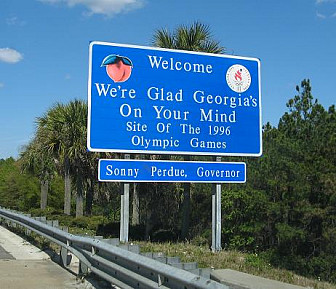President Biden & Climate Change: What’s Achievable?
Divided federal government might still allow possibility for meaningful action
With a victory in the presidential election, Joe Biden now faces a U.S. Senate that still hangs in the balance. But even with a Democratic runoff sweep in Georgia next month, it will be very divided. So what will be possible for a President Biden and his administration to achieve on climate change? Agency action, foreign policy changes, and spending can all make a difference on emissions, with any COVID stimulus and budget deals with Congress, if feasible, providing p...
CONTINUE READINGThe Georgia Runoffs and the Environment
Control of the Senate is at stake. So is Joe Biden's legislative agenda.
Georgia has two Senate contests due to a fluke of timing — one a regular election, the other a special election. Both elections have gone into runoffs. The outcomes will have major implications for the environment because control of the Senate is at stake. The regular election pits David Perdue (R) against Jonathan Ossoff (D). The special election pits Kelley Loeffler (R) against Rev. Raphael Warnock, the African-American pastor of the historic Ebenezer Baptist ...
CONTINUE READINGThe Changing Landscape of Climate Policy
Even under Trump, the U.S. was slowly lurching in the right direction. Biden needs to give the process a good strong push.
Barring a Democratic sweep in the Georgia runoffs, Biden will be facing a Republican Senate. But he also has a big advantage: The world has changed in some important ways that favor climate action. The importance of these positive changes may have been obscured by some negative developments. Since Barack Obama left office, climate change has become even more urgent, and Trump’s presidency has proved a disaster for environmental policy. His Supreme Court appointm...
CONTINUE READINGClimate Candidates Notch Victories in Major City Council Races Across Western U.S.
Voters choose new candidates with strong climate platforms in Los Angeles, Phoenix, San Diego, and other large cities across the West
While ballot counting continues across the country, city council races are now being called, with new climate champions set to take office in large Western U.S. cities that held elections this week. Many of the victors are taking on their first elected positions. Candidates with inspiring and ambitious climate platforms notched victories in six large Western U.S. cities: Los Angeles, Phoenix, San Diego, San Jose, San Francisco, and Portland. Other large cities by popu...
CONTINUE READINGWhat Next for Climate Policy?
The election outcome is still contested. Here are three possible scenarios.
We probably won’t be sure for a while who will be our next President. The GOP will probably control the Senate but even that isn’t completely certain yet. Rather than play forecaster, I thought it would be helpful to look at how various outcomes will impact climate policy. Since we’re all suffering a lot of angst right now, I wanted to start with a few positive things -- things that won’t change regardless of the election outcome. The first involves the ...
CONTINUE READINGThe Races to Watch
These are the down-ticket races most likely to impact environmental policy.
The presidency is by far the most important office on the line, but there are a host of down-ticket rates that will shape energy and environmental policy over the next few years. I’ve included links to previous posts that discuss the environmental views of the candidates in more detail. The Senate Control of the Senate will be crucial to the next President. Democrats seem to have their best shot at flipping Arizona, Colorado, and Maine. Given that Republicans a...
CONTINUE READINGWhat Could Trump Do with Four More Years?
He’s already rolled back almost everything Obama did. What next?
Given that Trump has rolled back nearly all of Obama's regulatory efforts, what further harm could he do? Quite a bit as it turns out. If you agree with him that regulation achieves nothing and only stands in the way of prosperity, that should make you very happy. To begin with, Trump can do more to prevent any future President from returning to a more pro-environmental path. Beyond filling the Ginsburg seat, there's the chance that Justice Breyer's seat will be...
CONTINUE READINGThe members of the U.S. Supreme Court cannot credibly decide 2020 elections cases
To do so could impair faith in our democratic institutions
When it comes to deciding cases that could affect the outcome of the 2020 election, all members of the U.S. Supreme Court have a serious conflict of interest – not because they may be political partisans, but because their jobs are at stake. It is well-understood that if the Democrats take the White House and both houses of Congress, there will be debate about changing the rules for membership on the Supreme Court. One possibility would involve an expansion of the co...
CONTINUE READINGGeoengineering: Ready for its Close-up?
After long being marginalized in climate debates, geoengineering is experiencing a surge in attention -- which carries both opportunities and risks.
If you’re a long-time Legal Planet reader, you may have noticed that I weigh in once a year or so to say that geoengineering – active engineered response to global climate change – is going to get prominent, and intensely contentious, soon. Geoengineering? Before continuing, we need a brief aside about names. Even what to call it is contested and shifting. In addition to geoengineering, people call it climate engineering, climate remediation, more recently clima...
CONTINUE READINGAdvancing Park Equity in Los Angeles
Investing in urban green space can improve public health and environmental conditions in Los Angeles’ underserved communities, while strengthening the environmental movement by inspiring people to become environmental stewards.
UCLA Law launched its first-ever Public Service Challenge this week, and the Emmett Institute is sponsoring two of the Challenge’s projects: a local garden cleanup with the Los Angeles Neighborhood Land Trust and phone banking with the Environmental Voter Project. Both projects provide the UCLA Law Community with the opportunity to support organizations that are fighting for a more sustainable future—both locally and nationally. Access to green space produces a ho...
CONTINUE READING













